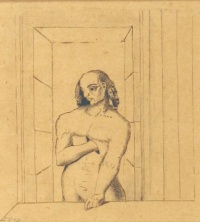Introspection
From The Art and Popular Culture Encyclopedia
(Difference between revisions)
| Revision as of 21:21, 27 May 2010 Jahsonic (Talk | contribs) ← Previous diff |
Current revision Jahsonic (Talk | contribs) |
||
| Line 1: | Line 1: | ||
| + | [[Image:The Heart Has Its Reasons by Odilon Redon.jpg |thumb|right|200px|''[[The heart has its reasons, of which reason knows nothing]]'' is a dictum from the ''Pensées'' (1669) by Blaise Pascal. It is here illustrated by Odilon Redon (c. 1887).]] | ||
| {{Template}} | {{Template}} | ||
| '''Introspection''' is a conscious mental and usually purposive process relaying on thinking/reasoning/examination of one's own thoughts and feelings. It can also be called '' [[contemplation]]'' on one's [[self (psychology)|self]], as opposed to [[extrospection]], the observation of things external to one's self. Introspection may be used synonymously with [[Human self-reflection|self-reflection]] and used in a similar way. Introspection is like the activity described by [[Plato]] when he asked, "...why should we not calmly and patiently review our own thoughts, and thoroughly examine and see what these appearances in us really are?" (''[[Theaetetus (dialogue)|Theaetetus]]'', 155) | '''Introspection''' is a conscious mental and usually purposive process relaying on thinking/reasoning/examination of one's own thoughts and feelings. It can also be called '' [[contemplation]]'' on one's [[self (psychology)|self]], as opposed to [[extrospection]], the observation of things external to one's self. Introspection may be used synonymously with [[Human self-reflection|self-reflection]] and used in a similar way. Introspection is like the activity described by [[Plato]] when he asked, "...why should we not calmly and patiently review our own thoughts, and thoroughly examine and see what these appearances in us really are?" (''[[Theaetetus (dialogue)|Theaetetus]]'', 155) | ||
| ==See also== | ==See also== | ||
| + | *[[Human self-reflection]] | ||
| + | *[[Insight]] | ||
| + | *[[Introversion]] | ||
| + | *[[Mode (literature)]] | ||
| *[[Phenomenology (philosophy)|Phenomenology]] | *[[Phenomenology (philosophy)|Phenomenology]] | ||
| *[[Phenomenology (psychology)]] | *[[Phenomenology (psychology)]] | ||
| *[[Psychophysics]] | *[[Psychophysics]] | ||
| + | *[[Psychonautics]] | ||
| + | *[[Rumination (psychology)]] | ||
| *[[Self-awareness]] | *[[Self-awareness]] | ||
| *[[Self-consciousness]] | *[[Self-consciousness]] | ||
| *[[Style (fiction)]] | *[[Style (fiction)]] | ||
| - | *[[Mode (literature)]] | ||
| {{GFDL}} | {{GFDL}} | ||
Current revision

The heart has its reasons, of which reason knows nothing is a dictum from the Pensées (1669) by Blaise Pascal. It is here illustrated by Odilon Redon (c. 1887).
|
Related e |
|
Featured: |
Introspection is a conscious mental and usually purposive process relaying on thinking/reasoning/examination of one's own thoughts and feelings. It can also be called contemplation on one's self, as opposed to extrospection, the observation of things external to one's self. Introspection may be used synonymously with self-reflection and used in a similar way. Introspection is like the activity described by Plato when he asked, "...why should we not calmly and patiently review our own thoughts, and thoroughly examine and see what these appearances in us really are?" (Theaetetus, 155)
[edit]
See also
- Human self-reflection
- Insight
- Introversion
- Mode (literature)
- Phenomenology
- Phenomenology (psychology)
- Psychophysics
- Psychonautics
- Rumination (psychology)
- Self-awareness
- Self-consciousness
- Style (fiction)
Unless indicated otherwise, the text in this article is either based on Wikipedia article "Introspection" or another language Wikipedia page thereof used under the terms of the GNU Free Documentation License; or on research by Jahsonic and friends. See Art and Popular Culture's copyright notice.

